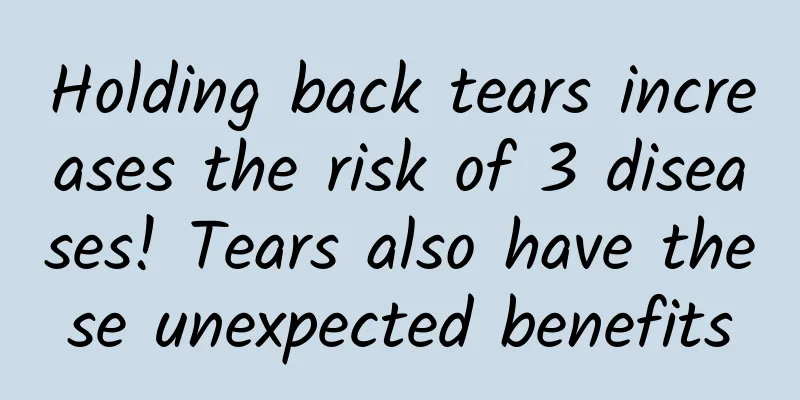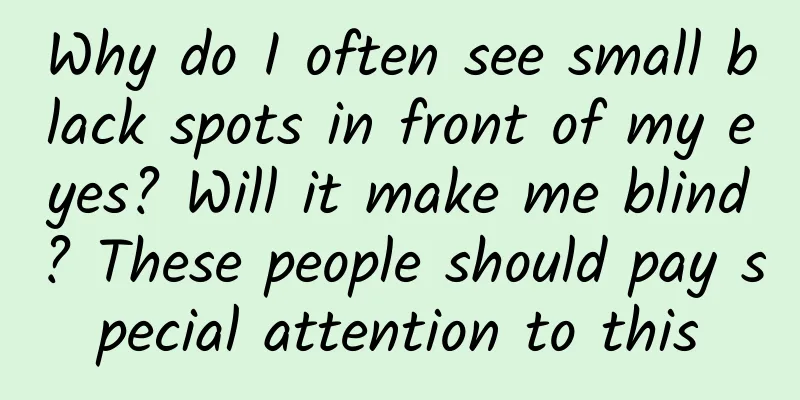Holding back tears increases the risk of 3 diseases! Tears also have these unexpected benefits

|
"It's not a sin for men to cry." When you are sad, should you cry or not? What’s the use of crying? It seems that there is no conclusion in the music industry. What about from a scientific perspective? Mental Health Center, West China Hospital, Sichuan University Chief Physician and West China School of Clinical Medicine To the 2021 five-year clinical students: Liu Jingya, Song Tianyi, Tao Kai, Yang Zerui I want to tell everyone who has ever held back their tears Cry, those are tears, I want to hug you ▽ Because appropriate crying is good for your health . Tears can inhibit bacteria because they contain lysozyme; Good for longevity. Studies have shown that tears can expel harmful substances produced by stress and negative emotions, such as endorphins, leucine-enkephalin, prolactin and hormones, which can relieve stress. Good for eye health. Tears lubricate the eyeball and eyelids, ensuring normal eye function and protecting against infection. If we often hold back our tears when we should, it is equivalent to damaging our health ! Basic medical research has found that sad tears contain substances that are harmful to the human body, including the trace element manganese and some norepinephrine . ● Too much accumulation of manganese in the body can easily cause Parkinson's disease and damage a person's mental health; ● Accumulation of norepinephrine in the body may lead to high blood pressure and coronary heart disease. On the other hand, when we are extremely happy and cry , researchers believe that this seemingly abnormal behavior is actually a balancing mechanism of the body that can help us control uncontrolled emotions and restore emotions. Proper crying is not only for physical protection It is also a psychological comfort In every sensitive and vulnerable moment Give yourself some space, a cry will make you feel better! In fact, crying is very magical . A seemingly simple behavior can produce a variety of psychological and emotional interactions with oneself and the environment: Give Feedback Crying is a signal of a need for social support Crying is a form of communication that can promote interpersonal relationships and interactions , and convey our desire to be supported. In an intimate relationship, crying is an act of weakness, meaning you voluntarily give power to the other person and choose to show your weak and helpless side. It effectively sends the signal that you are "non-threatening and approachable," and it also makes it easier for your partner to approach you and give you support. Self-soothing Crying helps calm your emotions Another function of crying is self-soothing. When no one can effectively comfort you, self-soothing becomes even more important. Psychologists point out that this soothing effect may be related to endorphins - whether it is physical contact and caress, or the feeling of water flowing while taking a bath, it will promote the release of endorphins in the brain, which can promote emotional release and gain a sense of comfort. Accept Emotions Crying can help with emotional contagion and empathy One study found that when people were shown a face with tears, the tears made observers feel closer to the crying person than to a face without tears. When we hear crying, our thalamic cingulate circuit is activated, and brain areas related to cognitive activities such as empathy, motivation, and social attachment are also active; therefore, it is easier for us to empathize with others. If you often hold back your tears when you could be crying, it may cause many psychological problems . Psychological research shows that if a person's emotions are not released for a long time, he will become introverted, dull, negative, and may even engage in extreme behaviors such as self-harm and suicide . Since I was a kid, I only heard adults say "What's the point of crying" I just realized now that crying is very useful. So why do we cry? As we all know, humans are the only primates that can cry . In 1983, Professor Pericles Danton, a biologist at the University of Melbourne, Australia, studied and compared the physiological mechanisms of humans and other mammals in controlling salt balance in the body. The research suggested that human tears may originate from the salt secretion mechanism of the lacrimal glands of marine mammals. Since then, a theory to explain human crying, the Sea Ape Theory , was born. Although this theory is now accepted by most people, it still lacks reliable fossil evidence. I remember the last time I heard a foodie tell a story. Said that because the barbecue didn't have cumin, it tasted so bad that I cried I learned to cry only after I found out that tears are salty Now getting back to the topic, let’s look at the physiological process of crying . When we feel wronged or are in a bad mood, the activity of the sympathetic and parasympathetic nerves increases: ▶ Once crying begins , parasympathetic nerve activity increases for a long time, regulating the tear glands to discharge tears; ▶ When we are about to calm down from crying , parasympathetic nerve activity increases, and enkephalin will provide an inhibitory pathway to block the secretion of the tear glands by blocking receptors. In fact, crying is often not just due to mood, but may also be driven by social factors . For example, when we were newborn babies, we could mainly (only) express our needs through crying. Studies have shown that newborns change the tone of their cries to express different demands; around 10 months, babies begin to understand that they can use crying to achieve other purposes beyond eating, drinking, defecating and urinating. Therefore, many parents hope to raise their children to be "good children who don't cry." If many children are forced to hold back their tears when they are upset from a young age, they will not be able to resolve their emotions, and negative energy will accumulate; especially when they reach adolescence, their rebellious mentality will be very serious. When they grow up and enter society, they will have to bear this pain alone without crying. So, when you want to cry, just relax and cry. Laugh as much as you want when you want to laugh~ If you think this article is helpful to you, please share it ! If you have any other questions about psychology, you can leave a message in the comment section~ |
<<: Are we all premature babies? Nezha is the normal one?
>>: It’s called orchid but it’s not an orchid. This new species discovered in Wuhan is not simple!
Recommend
What’s wrong with a mobile phone software that causes it to be deleted after a short period of time?
The PC Internet era is gradually fading away, and...
Humidifiers can kill people? These three types of people are not recommended to use them →
As the weather gets colder, whether in the north ...
How much does it cost to attract investment in Huangshan Machinery Equipment Mini Program?
Is it easy to attract investment for Huangshan Me...
The latest news on pension adjustments for retirees in 2022: How much will it increase? Attached is the latest official adjustment notice
In recent years, the pensions of retired people i...
How to place e-commerce advertisements for TikTok overseas promotion?
In 2020, when the epidemic suddenly spread across...
The mysterious octopus species is actually most similar to humans?
Leviathan: Compared to the soft body of the octop...
Why is pottery fired at 1000°C and porcelain fired at 1200°C?
Ceramics, an art form that combines traditional C...
What is the specific situation of the WTO suspension of the meeting? How long will the suspension last? Attached is the reason for suspension!
On March 10, local time, WTO Director-General Aze...
Trapped in the elevator for 2 hours, almost fainted due to lack of oxygen...
Evening of November 22 The elevator next to a hot...
What should I do if the information flow account does not work? Here is an account optimization guide, please keep it!
Information flow advertising is actively displaye...
Does a low-carb diet make you bald and stupid? Let's find out the truth
Speaking of carbohydrates, everyone should be fam...
B station community operation strategy!
Today we are going to talk about the small broken...
Daqing SEO Training: How to optimize the website to attract users? What can SEO do?
Nowadays, most popular websites on the Internet h...
From domestication and breeding 1.0 to intelligent design 4.0, this is the power of seeds!
Rice provides staple food for about 50% of the wo...
2,400 meters underground, the country's most important equipment is put into operation! Why is the world's deepest and largest deep underground laboratory in Jinping?
On December 7, the civil engineering and public w...


![[Case] How to create video ads that better understand young people?](/upload/images/67cc17aca3d30.webp)






